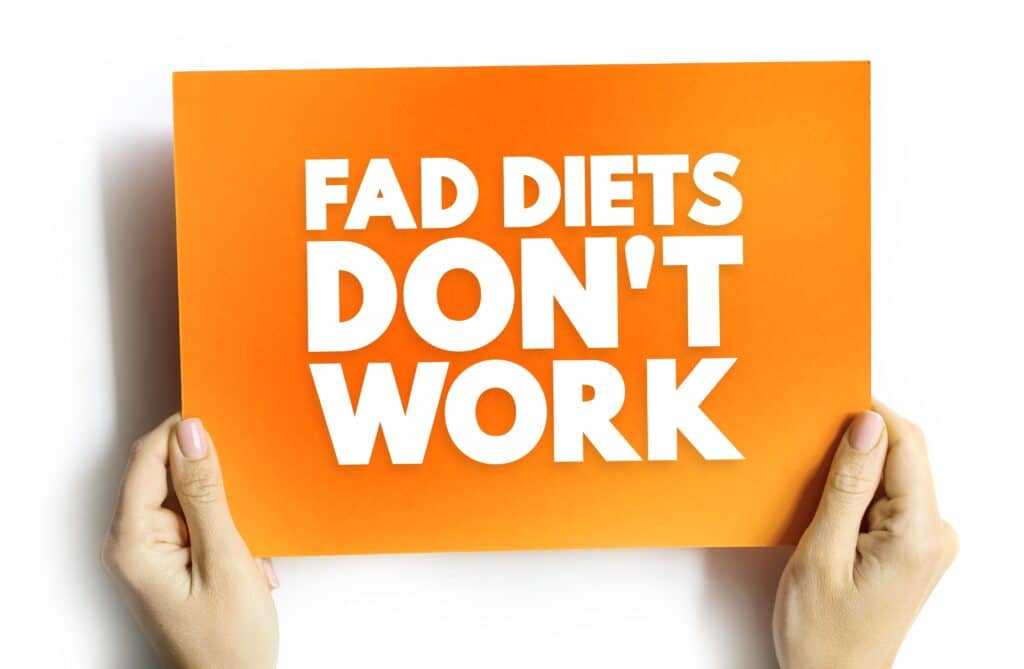As the calendar turns the page to a new year, the allure of a fresh start motivates many to embrace healthier practices. While New Year’s resolutions often include a commitment to healthier habits, misinformation and the promotion of fad diets can sometimes cloud judgment. The idea behind adopting a new diet is often well-intended, but it’s essential for people to be aware of the potential dangers associated with quick fix diets, rather than lifestyle shifts that promote nourishment and create lasting, sustainable habits.
“The appeal of fad diets as New Year’s resolutions is rooted in the desire for rapid and tangible results,” said Sylvia Melendez-Klinger, DBA, MS, RD. Fad diets often promise swift outcomes in the new year, such as rapid weight loss, increased energy levels, and an overall boost in well-being, tapping into society’s inclination towards instant gratification and self-transformation. However, it’s crucial to see beyond these tempting promises and consider the potential risks and long-term implications associated with such drastic dietary changes. “Fad or trendy diets typically promote restrictive eating patterns, often eliminating entire food groups,” states Melendez-Klinger. “This can lead to disordered thoughts around food, a negative relationship with food and body image, nutrient deficiencies, and ultimately, health issues.”
The KETO diet, for instance, significantly limits carbohydrate intake, which plays a crucial role in providing energy to the body and can affect cognitive function and physical performance. “Folic acid, magnesium, and vitamin C, among others, can be of concern as you eliminate grains, legumes, and fruits from the [Keto] diet,” said Charlotte Martin, MS, RDN, CSOWM, CPT. “Whole grains, which are some of your best natural sources of fiber, must be eliminated [from the Keto diet], yet we need about 25 to 30g of fiber per day to support healthy digestion and avoid constipation,” Melendez-Klinger added. “Given that nearly 95 percent of Americans fall short of the daily recommended fiber intake, most Americans would benefit from increased consumption of fiber-rich foods, like grains. In fact, it’s thought that a lack of dietary fiber is a primary feature of the typical Western diet that has led to a rise in chronic disease.” Similarly, the OMAD diet restricts the consumption window and condenses eating into a single meal, potentially leading to inadequate intake of essential nutrients throughout the day and frequent symptoms such as nausea, irritability, and lack of energy.
A well-balanced diet includes a variety of food groups to ensure essential nutrients are being obtained. To achieve whole-body nourishment, it’s necessary to adopt diets that include a balanced mix of macronutrients (carbohydrates, proteins, and fats) and micronutrients (vitamins and minerals). The Mediterranean diet is renowned for its emphasis on fruits, vegetables, whole grains, lean proteins, and unsaturated fats, with links to healthy weight loss and even increased lifespan. The DASH (Dietary Approaches to Stop Hypertension) diet is another great option, which promotes a mix of fruits, vegetables, lean proteins, whole grains, and low-fat dairy to support heart health and weight management. These diets exemplify the importance of incorporating diverse food groups in appropriate ratios to foster overall health and nutritional adequacy. The My Plate guidelines, based off the Dietary Guidelines for Americans, recommend filling half your plate with fruits and vegetables, a quarter with lean proteins, and a quarter with whole and enriched grains. These balanced ratios ensure that the body receives the necessary nutrients for optimal functioning.
While fad diets may yield quick results, their unsustainability over time is often a major drawback. These diets may show initial results, but their restrictions and drastic changes make them difficult to maintain and can lead to nutritional deficiencies. As a result, individuals may find themselves reverting to old habits, doing more harm than good.
To achieve long-term success in health and wellness, it’s important to focus on realistic approaches. As New Year’s resolutions are claimed, health professionals should encourage gradual, easy to accomplish lifestyle changes rather than restrictive, unrealistic approaches. By prioritizing nourishing diets that encompass a variety of food groups and incorporate manageable practices, such as the Mediterranean or DASH diet, individuals can steer clear of the pitfalls associated with fad diets and set the foundation to a healthier and more sustainable way of life.

